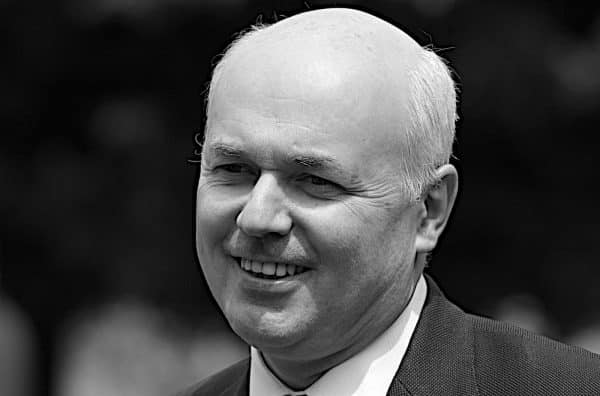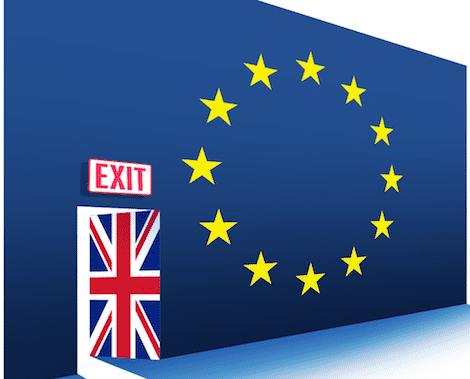BRITAIN AND THE EU: STAY IN OR BREXIT?
Since mid-March a strange air of unreality has pervaded mainstream politics in Britain. Everything seems to have been thrown into disarray. The pretence of unity in government ranks has been abandoned. Cabinet ministers who earlier this year all uttered the same duplicitous platitudes while spouting the appropriate propaganda line attempting to justify continuing and intensified austerity as the only way to economic recovery, have fallen out with each other. Among those who have thrown down the gauntlet against cabinet colleagues and backbenchers with whom they disagree, gentlemanly and ladylike decorum have been replaced by rancour and vindictiveness.

Iain Duncan Smith: A man of shifting principles. He detonated a big rififi among ruling class factions.
On March 18th the former Secretary of State for Work and Pensions, Iain Duncan Smith, resigned from office and unleashed a blistering attack on the Prime Minister and the Chancellor of the Exchequer, whom he accused of unfairly cutting payments to disabled people (personal independence payments) in order to retain generous benefits for pensioners who were more likely to vote Conservative. Prime Minister Cameron counter-attacked with the charge that Duncan Smith himself had designed the cuts that had prompted his resignation. Indeed, IDS’s newly discovered sympathy for working-aged people on whose backs he now correctly claimed the books were to be balanced, was very puzzling given his hitherto unwavering enthusiasm for ever deeper welfare cuts. For a few days it looked as though George Osborne, whose recently delivered spring budget was being assailed from all sides, might not survive as chancellor. But the Brussels airport bombings on the 22nd March knocked the dispute off the front pages, robbing Duncan Smith of the opportunity to gain maximum advantage from his resignation and removing the spotlight from Osborne’s floundering performance.
The EU Referendum: Disarray in Government’s Ranks
[dropcap]T[/dropcap]his bizarre state of affairs has come about because prior to the May 2015 election Cameron rashly promised an in/out referendum on Britain’s continuing membership of the European Union. This promise was made initially in 2013, contingent upon the Tories winning an overall majority in 2015. As last year’s May election drew closer all the opinion polls were predicting no overall majority for any party – an outcome almost everyone, including Cameron, seemed resigned to. The Tories were haunted by the prospect of large numbers of their traditional middle class supporters transferring their votes to UKIP. UKIP’s appeal, not only to much of the Tory constituency, but also to some of Labour’s natural support base, rested on its opposition to immigration and membership of the EU. These were views also held by perhaps 50% of Tory MPs. It was largely because of the perceived threat from UKIP and an attempt to neutralise its impact, that Cameron promised the referendum. He probably thought he would never have to make good on the pledge, which was included in the election manifesto, because the best outcome he could expect was one which would result in another coalition with a collection of small parties largely opposed to holding a referendum. So, when to his and everyone else’s surprise, he emerged with an overall majority, he woke up to the fact that as far as EU membership (which he favoured) was concerned, he had inherited a poisoned chalice. This may also account for the fact that he chose to hold the referendum sooner rather than later. By the late summer of 2015 it was evident that the migrant crisis on Europe’s southern borders – largely a consequence of the western initiated wars in Afghanistan, Iraq and Libya – could only worsen. This led to Cameron’s frantic attempts earlier this year to cobble together from his tour of EU member states a few concessions for the UK that could be presented as a triumph for his negotiating skills in Britain’s national interest. In May the House of Commons voted overwhelmingly (544 to 54) in favour of holding a referendum. Only the Scottish National Party voted against. The SNP opposition to the referendum may yet turn out to be more significant than appeared at the time. Also of significance is the fact that the first ministers of the devolved national assemblies argued against holding the referendum in June 2016 as the devolved national elections as well as the London mayoral election are to be held in May 2016, running the risk of conflating the issues for these events. Their request to postpone the referendum until 2017 was turned down.
[dropcap]I[/dropcap]n February Cameron formally declared his support for the UK remaining in the EU and released members of the cabinet and the parliamentary party from collective responsibility in support of the position taken by the government. Twenty three of the thirty cabinet ministers back Cameron in support of Britain’s continued membership; seven want out. But the balance of opinion in the cabinet is not reflected amongst Tory backbenchers. Of the majority who have declared their views, 163 want to remain and 130 to leave. Such a stark division does not exist in any other parliamentary party. Amongst the Tory constituency parties almost certainly a large majority are for Brexit. The parliamentary Labour party is overwhelmingly pro-EU (215/7). Much of the speculation about the rank and file membership’s supposed support for remaining in the EU may be based on this, but there is likely to be a sizeable section favouring Brexit. Many of the recent recruits into Labour’s ranks from those hitherto outside the party are likely to share the hostility to the EU that has for long characterised many of the organizations to the left of Labour. Jeremy Corbyn has now made a clear statement in support of Britain remaining in the EU. His support for continued membership and appeal to his supporters to back him, is, he has made clear in spite of all its faults; “warts and all” as he put it.
The Tories resort to Internecine Warfare
[dropcap]I[/dropcap]t is tempting to treat the open warfare that has broken out among Tory ministers and other big-wigs with unalloyed amusement, not to say hilarity. This is the party that used always to pride itself that its strength lay in its unity. Of course, everyone knew that there were, and had been for decades, deep divisions within the ranks over membership of the EU. Everyone knew that UKIP was composed largely of deserters from the xenophobic right wing of the party and that large numbers of Tory MPs and larger numbers of constituency party members held views identical to UKIP’s. But the spectacle of prominent government ministers hurling accusations and sometimes personal abuse at one another in public was something quite new. Prominent Brexit supporters like justice secretary Michael Gove, Ian Duncan Smith and London Mayor Boris Johnson are locked in battle with Cameron, Osborne and foreign secretary Philip Hammond. With each day that passes it becomes more difficult to see how these belligerents can ever work harmoniously together again no matter what the outcome of the referendum. The Labour opposition may be forgiven for sitting back and enjoying the spectacle of the Tory party tearing itself apart over the one issue that has always been its Achilles heel; but what of the substantive political and economic issues at the heart of the controversy?
It is reasonable to say that the majority of those who vote in the referendum will do so with no more than the most superficial understanding of the arguments for and against continued membership of the EU. It is sometimes claimed that younger people between the ages of 18 and 30 are more supportive of the EU and more likely to want to stay in than are older people. But it is also the case, on the evidence of all recent elections that they are less likely to vote at all. Anecdotally it would appear that there is an astonishing level of ignorance about the EU among younger people. If, for example, one compares the responses of randomly selected interlocutors on the streets of British cities with their counterparts in, say, Belgium and Germany, one is struck by the level of ignorance of the former as compared with the latter. This could also well be the case with older people. In the run-up to the referendum there is little sign that the issues will be dealt with by the media or by partisans of either side in a way likely to bring greater clarification to those who remain largely ignorant of their import. Brexit supporters have accused the Remain camp of attempting to sow panic and fear of the unknown among those who might vote to leave. This worked in the Scottish independence referendum and it was probably also a factor in Tory propaganda that helped them win the 2015 general election. Such fear-mongering does nothing to promote informed and rational consideration of the arguments. Rather than becoming embroiled in the minutiae of detail about the political origins and history of the European project and its expansion since the end of the Second World War, it may be of greater value to offer a broad-sweep, left perspective on the issues pertinent to the in/out referendum.
The EU: Anti-democratic and irreversibly committed to Neo-liberal, Finance Monopoly Capitalism
“Elections cannot be allowed to change an economic programme of a member state.” Wolfgang Schauble, German finance minister, to Greek finance minister Yanis Varoufakis, Berlin, July 2015.
[dropcap]T[/dropcap]he fact that this outrageous, anti-democratic statement was not roundly condemned by any members of the EU’s leading institutions or by the governments of any of the other 27 member states, tells us a great deal about the nature of the EU and the pusillanimous abandonment of democratic principles and practices by the leaders of most of its member states. According to Varoufakis, another (unnamed) EU finance minister at the same meeting in Berlin told him “Yanis, you must understand that no country can be sovereign today, especially not a small bankrupt one like yours.” Varoufakis comments: “This line of argument is probably the most pernicious fallacy to have afflicted public debate in our modern liberal democracies and indeed I would go as far as to suggest that it may be the greatest threat to democracy itself.” He goes on to say that “the same noxious dictum is today being peddled in the UK, supposedly as a clinching argument in favour of the Remain campaign.” Because criticism of the EU’s denial of national sovereignty to its member states comes so often from political figures on the right, particularly the extreme, xenophobic right, does not mean that the charge is untrue or any the less valid. Some on the left, who, albeit grudgingly, support membership of the EU, seem to do so in the belief that its supposed internationalism and commitment to the free movement of labour make it a price worth paying for the loss of sovereignty and subjection to a thoroughly un-democratic and anti-democratic institution. There is an argument to the effect that for all its faults, remaining in the EU is far preferable to leaving, and that the only sensible course is to work to reform it into a democratic institution that works in the interests of the people of Europe rather than to preserve and extend the power of the dominant corporate power elites.
This is a view that seems to be held by Yanis Varoufakis. Strangely, he reaches this conclusion despite his devastating indictment of the brutal cruelty with which the Troika casually condemned the Greek people to penury. He also makes clear why the Troika could not allow the Syriza government to succeed in winning Greek debt relief, rejecting austerity and remaining in the euro zone; if Greece were to succeed, it would encourage the same demands, expecting the same outcome, in Italy, Spain and Portugal. Subjecting the Greek people to a humiliating defeat would persuade others that resistance was useless. There could hardly be a better example of the lunacy of the neoliberal austerity programme whose advocates and practitioners continue again and again to impose its baleful strictures despite their unavoidably disastrous consequences. If there were some evidence that the existing EU power structure could be radically reformed and thoroughly democratised, there might be something to be said for working to reform it. But all the evidence, presented so clearly by Varoufakis, leads to the opposite conclusion.
Power in the European Union
[dropcap]I[/dropcap]n a recent article, Wolfgang Kawalsky, a trade union policy adviser in Brussels, used the phrase “facadisme” to describe some of the EU’s most esteemed institutions: “a quasi-constitution”, “a quasi-parliament”, “a quasi-government” and a “quasi-court of justice.” The Commission, a non-elected body with an appointed president has a monopoly on the right to legislate. There is no democratic control of the European Central Bank, which is run by supposedly expert technocrats appointed by the bank itself. Most of the European regulatory agencies operate on a similar basis. One doesn’t need to idealize the national parliaments of nominally democratic European countries to recognise that the European Parliament, to put it mildly, operates under a colossal democratic deficit. No-one who defends the EP’s modus operandi has any right to criticise any authoritarian rigged legislature. Kawalsky makes clear that since the financial crisis of 2008 the EP has “changed sides”. It has voluntarily accepted undemocratic procedures. It adopts legislation on one reading in a process of “trialogue between the EP, the European Council and the Commission, behind closed doors.” The Troika – the Commission, the European Central Bank and the IMF (which is not part of the EU) are subject to no democratic control. They are all run by “experts”.
There is no convincing evidence that the dominant institutions of the EU can be democratized. Membership of the EU has resulted in the erosion of parliamentary sovereignty and all but eliminated the possibility of independent democratic decision-making on crucial matters of economic policy in member states. In Britain, all but one of the parties represented at Westminster are committed to Britain remaining in the EU. The exception is the UK Independence party (UKIP) which campaigns for Britain’s withdrawal. Ironically, UKIP has the largest number of members of the European Parliament (24) with only one elected member at Westminster, despite having polled nearly four million votes in the 2015 election. The formal commitments of the main pro-EU parties do not necessarily reflect the opinions of their members or supporters, as is clear from the split among Tory MPs. Whatever may be the motivation for the stance of those supporting Britain leaving or remaining, the EU should be recognized for what it is – a political and economic corporate power bloc committed to promoting the interests of finance, monopoly capitalism in its current neo-liberal form. As such it promotes privatization, downward pressure on wages, attacks on and elimination of trade union rights and collective bargaining, cuts in welfare and relentless austerity.
The Referendum: Factors determining the outcome
[dropcap]I[/dropcap]n one respect the division on the political right in Britain between the “in” and “out” camps may be said to reflect the tensions and contradictions between big and small capital. The banking sector is strongly in favour of remaining as are such companies as Shell, Vodafone and BT. Earlier this year, according to a survey of over 4,000 companies by British Chambers of Commerce, only 18% favoured withdrawal while 60% were against. But there are other factors operating which will play an important part in determining the way people vote. Among them are the many popular prejudices, often shaped over many years by much of the media. Some of these reflect deep anxieties among large sections of society, such as unskilled, de-skilled or unemployed white workers who feel cast adrift. Anti-immigration, Xenophobia and racism play a part also among large numbers of hard-pressed middle class people who have seen their living standards eroded. From these sections of society much of UKIP’s support comes. Particularly during the years of austerity since the financial crash of 2008 and the onset of the Great Recession, the scurrilous right-wing tabloid press has scapegoated welfare dependents, refugees, East European migrant workers and “unpatriotic elements” on the left who are accused of hating Britain. All this has resulted in the emergence of the odd and unfamiliar situation referred to at the start of this article: disarray in the ranks of the dominant elites. It has taken some strange forms.
The newspapers that are referred to as the “popular press” in Britain, that is, those rabidly right wing tabloids controlled by press barons Murdoch, Desmond and Rothemere, which, despite the decline of the print media, still have daily sales running into many millions, are all critical of the EU and are likely to support Brexit. The editorial stance taken by such papers may appear to conflict with the corporate class interests of their proprietors. Such contradictions within the elite are nothing new. But Cameron and his supporters are worried. Cameron is now in the laughable position of having to rely upon Jeremy Corbyn to help him win the referendum. This means trying to win over the trade union leadership at a time when the Tories are hell bent on imposing drastic anti-strike legislation against the unions. The prime minister’s popularity is at an all-time low in part due to the revelation contained in the Panama papers that he benefitted from tax avoidance by a company his father set up in the British Virgin Islands. It is far from certain that the Remain camp will win the referendum.
Brexit: Decisive Factors for the Left
[dropcap]N[/dropcap]o one can say with any certainty what the longer-term outcome of a vote to leave might be. But there is plenty of evidence suggesting that the single currency and perhaps the EU itself are in terminal crisis anyway. Its future will not be made secure by Britain remaining a member. Two very strong reasons may be adduced for getting out:
- TTIP (The US/EU Transatlantic Trade and Investment Partnership) It is likely that most people in Britain have never hear of TTIP. This is no accident. Its terms have been negotiated in great secrecy and are rarely reported on. In 92% of all stakeholder meetings with the EU Commission, only representatives of companies were heard. TTIP is a trade deal between the US and the EU. Negotiations are still in progress. A similar deal (CETA the Comprehensive Economic and Trade Agreement) between the EU and Canada, has been concluded and after being ratified by the EP it will be enacted by the Commission. Under the terms of TTIP the democratic rights of UK citizens will be overridden. It will be possible for multi-national corporations to sue national governments if they claim that laws and regulations have damaged their investments. They will be able to take governments to arbitration if they attempt to regulate or ban high-risk technology, which is likely to lead to extra pressure to allow fracking. Workers’ rights and jobs will be endangered in a “race to the bottom.” Multinational corporations will have the right, for example, to prise open the British education service and the National Health Service and, if such public utilities should be privatized it will be impossible to return them to the public sector.
So widespread is ignorance about TTIP that on his recent visit to the UK, President Obama, obviously enlisted to come to the aid of the remain campaign, even referred to it to suggest that if the British people voted to leave the EU we would have to “go to the back of the queue” (a formulation that could have only been suggested by Cameron) and wait for maybe ten years if we wanted to get such a wonderful trade deal with the USA!
While it is impossible to know what the long-term consequences of Brexit might be, there is no doubt what the immediate consequences of a vote to leave would be. Cameron and probably Osborne would be forced to resign. There would be a major crisis of political leadership and the Tory party would be plunged into open warfare of a ferocity that would make the present infighting seem like a petty spat. And in the not unlikely event that the Scottish vote might go heavily in favour of remaining in the EU, very soon afterwards there would likely be an irresistible demand for a second referendum on independence. The outcome could be the break-up of the United Kingdom.
 Mike Faulkner is a British citizen. He lives in London where for many years he taught history and political science at Barnet College, until his retirement in 2002. He has written a two-weekly column, Letter from the UK, for TPJ Magazine since 2008. Over the years his articles have appeared in such publications as Marxism Today, Monthly Review and China Now. He is a regular visitor to the United States where he has friends and family in New York City. Contact Mike at mikefaulkner@greanvillepost.com
Mike Faulkner is a British citizen. He lives in London where for many years he taught history and political science at Barnet College, until his retirement in 2002. He has written a two-weekly column, Letter from the UK, for TPJ Magazine since 2008. Over the years his articles have appeared in such publications as Marxism Today, Monthly Review and China Now. He is a regular visitor to the United States where he has friends and family in New York City. Contact Mike at mikefaulkner@greanvillepost.com Note to Commenters
Due to severe hacking attacks in the recent past that brought our site down for up to 11 days with considerable loss of circulation, we exercise extreme caution in the comments we publish, as the comment box has been one of the main arteries to inject malicious code. Because of that comments may not appear immediately, but rest assured that if you are a legitimate commenter your opinion will be published within 24 hours. If your comment fails to appear, and you wish to reach us directly, send us a mail at: editor@greanvillepost.com
We apologize for this inconvenience.
=SUBSCRIBE TODAY! NOTHING TO LOSE, EVERYTHING TO GAIN.=
free • safe • invaluable
[email-subscribers namefield=”YES” desc=”” group=”Public”]
Nauseated by the
vile corporate media?
Had enough of their lies, escapism,
omissions and relentless manipulation?
Send a donation to
The Greanville Post–or
But be sure to support YOUR media.
If you don’t, who will?



